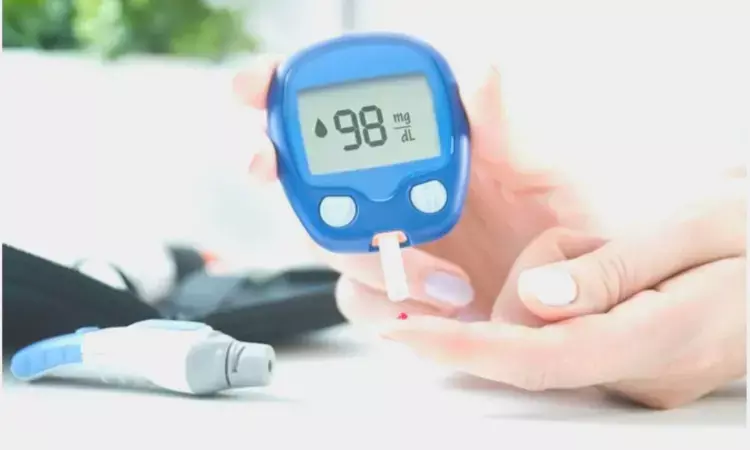- Home
- Medical news & Guidelines
- Anesthesiology
- Cardiology and CTVS
- Critical Care
- Dentistry
- Dermatology
- Diabetes and Endocrinology
- ENT
- Gastroenterology
- Medicine
- Nephrology
- Neurology
- Obstretics-Gynaecology
- Oncology
- Ophthalmology
- Orthopaedics
- Pediatrics-Neonatology
- Psychiatry
- Pulmonology
- Radiology
- Surgery
- Urology
- Laboratory Medicine
- Diet
- Nursing
- Paramedical
- Physiotherapy
- Health news
- Fact Check
- Bone Health Fact Check
- Brain Health Fact Check
- Cancer Related Fact Check
- Child Care Fact Check
- Dental and oral health fact check
- Diabetes and metabolic health fact check
- Diet and Nutrition Fact Check
- Eye and ENT Care Fact Check
- Fitness fact check
- Gut health fact check
- Heart health fact check
- Kidney health fact check
- Medical education fact check
- Men's health fact check
- Respiratory fact check
- Skin and hair care fact check
- Vaccine and Immunization fact check
- Women's health fact check
- AYUSH
- State News
- Andaman and Nicobar Islands
- Andhra Pradesh
- Arunachal Pradesh
- Assam
- Bihar
- Chandigarh
- Chattisgarh
- Dadra and Nagar Haveli
- Daman and Diu
- Delhi
- Goa
- Gujarat
- Haryana
- Himachal Pradesh
- Jammu & Kashmir
- Jharkhand
- Karnataka
- Kerala
- Ladakh
- Lakshadweep
- Madhya Pradesh
- Maharashtra
- Manipur
- Meghalaya
- Mizoram
- Nagaland
- Odisha
- Puducherry
- Punjab
- Rajasthan
- Sikkim
- Tamil Nadu
- Telangana
- Tripura
- Uttar Pradesh
- Uttrakhand
- West Bengal
- Medical Education
- Industry
Glycemic variability closely associated with increase in risk of all-cause mortality

China: In a new study conducted by Junxiang Chen and the team, it was found that the number of unfavorable outcomes related to diabetes that long-term glycemic variability (GV) was associated with varied, as did the degree of correlations. The findings of this study were published in Diabetes Research and Clinical Practice.
Glycemic variability, which refers to swings in blood glucose levels, is often determined by monitoring changes in glucose or other associated glucose homeostasis measures during a certain period of time (i.e., within a day, between days or longer term). Although HbA1c was once thought to be the gold standard for measuring glycemic control, GV is now unquestionably acknowledged as being a more useful indicator of glycemic control than HbA1c in clinical settings. This study was done to measure the relationships between several measures of long-term glycemic variability and a variety of unfavorable outcomes associated with diabetes.
For this investigation, PubMed and Embase were searched from the beginning of the database up until 23rd August 2021. GV was determined using measures such as standard deviation (SD), coefficient of variation (CV), or other metrics and was based on readings of HbA1c or fasting plasma glucose (FPG). Death, renal disease, cardiovascular disease (CVD), peripheral neuropathy, retinopathy, dementia, and malignancy were among the outcomes. Using random-effects meta-analyses, the relative risks (RRs) were gathered.
The key findings of this study were:
1. There were 75 articles total, with 2,051,701 participants.
2. HbA1c variations were linked to all-cause mortality, CVD, renal disease, and peripheral neuropathy, but not retinopathy, when the top and bottom quartiles were contrasted.
3. FPG variations were not linked to peripheral neuropathy or cardiovascular disease, however, they were with renal disease and retinopathy.
4. In one study, associations between GV and both cancer and Alzheimer's disease were shown to be substantial.
Reference:
Chen, J., Yi, Q., Wang, Y., Wang, J., Yu, H., Zhang, J., Hu, M., Xu, J., Wu, Z., Hou, L., Zhang, Z., Zhang, Y., Wang, Y., Tu, Z., Yang, K., Pan, X., … Pan, A. (2022). Long-term glycemic variability and risk of adverse health outcomes in patients with diabetes: A systematic review and meta-analysis of cohort studies. In Diabetes Research and Clinical Practice (Vol. 192, p. 110085). Elsevier BV. https://doi.org/10.1016/j.diabres.2022.110085
Neuroscience Masters graduate
Jacinthlyn Sylvia, a Neuroscience Master's graduate from Chennai has worked extensively in deciphering the neurobiology of cognition and motor control in aging. She also has spread-out exposure to Neurosurgery from her Bachelor’s. She is currently involved in active Neuro-Oncology research. She is an upcoming neuroscientist with a fiery passion for writing. Her news cover at Medical Dialogues feature recent discoveries and updates from the healthcare and biomedical research fields. She can be reached at editorial@medicaldialogues.in
Dr Kamal Kant Kohli-MBBS, DTCD- a chest specialist with more than 30 years of practice and a flair for writing clinical articles, Dr Kamal Kant Kohli joined Medical Dialogues as a Chief Editor of Medical News. Besides writing articles, as an editor, he proofreads and verifies all the medical content published on Medical Dialogues including those coming from journals, studies,medical conferences,guidelines etc. Email: drkohli@medicaldialogues.in. Contact no. 011-43720751


